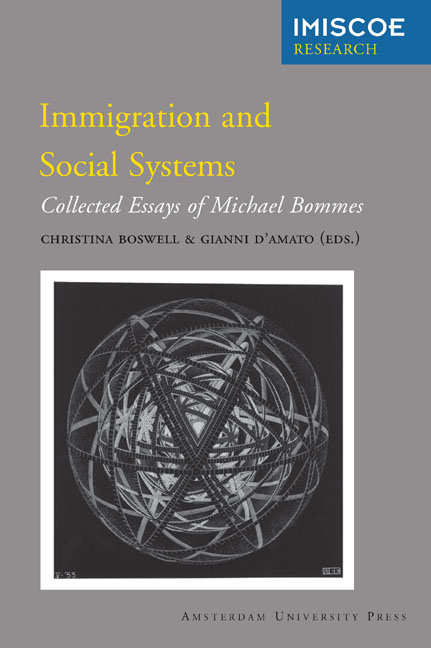Book contents
- Frontmatter
- Contents
- Foreword
- Preface
- Introduction
- 1 Migration in Modern Society
- 2 National Welfare State, Biography and Migration: Labour Migrants, Ethnic Germans and the Re-Ascription Of Welfare State Membership
- 3 Systems Theory and the ‘Ethnic Inequality’ of Migrant Workers
- 4 Welfare Systems and Migrant Minorities: The Cultural Dimension of Social Policies and its Discriminatory Potential
- 5 Transnationalism or Assimilation?
- 6 ‘Integration takes Place Locally’: On the Restructuring of Local Integration Policy
- 7 Illegal Migration in Modern Society: Consequences and Problems of National European Migration Policies
- 8 General and Specific Characteristics of Networks: (with Veronika Tacke)
- 9 National Paradigms of Migration Research: (with Dietrich Thränhardt)
- References
- Other IMISCOE Titles
9 - National Paradigms of Migration Research: (with Dietrich Thränhardt)
Published online by Cambridge University Press: 09 January 2021
- Frontmatter
- Contents
- Foreword
- Preface
- Introduction
- 1 Migration in Modern Society
- 2 National Welfare State, Biography and Migration: Labour Migrants, Ethnic Germans and the Re-Ascription Of Welfare State Membership
- 3 Systems Theory and the ‘Ethnic Inequality’ of Migrant Workers
- 4 Welfare Systems and Migrant Minorities: The Cultural Dimension of Social Policies and its Discriminatory Potential
- 5 Transnationalism or Assimilation?
- 6 ‘Integration takes Place Locally’: On the Restructuring of Local Integration Policy
- 7 Illegal Migration in Modern Society: Consequences and Problems of National European Migration Policies
- 8 General and Specific Characteristics of Networks: (with Veronika Tacke)
- 9 National Paradigms of Migration Research: (with Dietrich Thränhardt)
- References
- Other IMISCOE Titles
Summary
Migrations are an inherent part of current processes of globalisation and internationalisation, which undoubtedly provide the foundation for the increasing call for more international and comparative research. Accordingly, the number of international research projects and networks in the research area of migration has grown considerably over the last two decades. Scholars participating in this endeavour, however, soon discover that the academic modes of conceptualising, defining and recording problems depend to a large extent on the respective national histories of science. This applies particularly to academic research into international migration and the ensuing problems in the regions where migration begins and ends. Research questions and approaches are frequently designed along the lines of national traditions and patterns of state reactions towards international migration and its societal effects. Seen in this way, migration research seems itself to be rather a part of the complex of problems that it claims to describe and explain. This context dependency certainly becomes more visible in international research projects, since here researchers are more often compelled to explicate their preconceptions.
Systematically, this leads to a number of questions: To what extent and how is migration research shaped by ‘national paradigms’ or ‘hidden national agendas’ like ‘race relations’ in the UK, ‘ethnic minority policies’ in the Netherlands, ‘assimilation into a French citizenry’ in France or ‘integration into a welfare state’ in Germany? These paradigms are perhaps even present in critical efforts of scholars who strive to overcome their very boundaries. How do these national patterns influence the way in which international research and scientific modes conceptualise their research questions? What are the consequences of this for the claim of scientific validity with regard to propositions and applied theories? These questions have hardly been addressed systematically in migration studies (Lavenex 2005; Vasta and Vasoo 2006) yet their investigation is an essential precondition for adequately reflexive international research.
The assumption that research may be imbued with ‘national paradigms’ is intentionally constructed in a paradoxical manner. Put in this way, we focus on one characteristic of the field of research, i.e. the indexing of the paradigms of migration research as ‘national’.
- Type
- Chapter
- Information
- Immigration and Social SystemsCollected Essays of Michael Bommes, pp. 201 - 232Publisher: Amsterdam University PressPrint publication year: 2013



